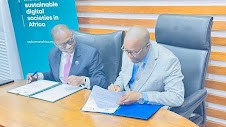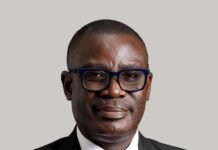By Abubakarr Harding
Sierra Leone has taken another giant step towards enhancing the digital space in the country with the signing of a historic Memorandum of Understanding (MoU) between the Ministry of Information and Communications and Smart Africa Digital Academy (SADA). The signing ceremony took place on Tuesday, April 4, 2023, at the Ministry of Foreign Affairs at Tower Hill.
The event was organized to launch the Smart Africa Digital Academy and to speak to their joint commitment in ensuring that people have access to digital technologies and making sure that they have connectivity within the nation.
In his welcome address, the Deputy Minister of Information and Communications, Solomon Jamiru Esq, expressed his delight for embarking on a journey with SADA adding how the Ministry would not let this opportunity slip away but would ensure that they utilize it to the fullest to achieve the desired outcome.
The Deputy Minister also stated that much of what was crystallized was anchored on the privacy and vision of President Julius Maada Bio, who gave specific instructions to the Minister to ensure that they build a digitally inclusive society.
It must be noted that the Information Minister, Mohamed Rahman Swarray has been rolling out that vision, and the MoU signed with SADA is a significant step towards achieving that.
The Deputy Minister emphasized that the African Union’s digital transformation for 2020 to 2030 urges all of Africa to ensure that people on the continent have access to at least 6 gigabytes per second of internet speed in a safe and secured manner.
He also noted that the African Free Trade Content Area offers prospects that will not be profitable in the future if Africa does not take steps to actualize it underscoring that the philosophy drives Smart Africa.
The Director-General and Chief Executive Officer of Smart Africa, Lacina Kone, stated that he met the Minister at the UN General Assembly in July and also in Paris. He added that the Minister had been asking him to come to Sierra Leone whenever they meet. Mr. Kone emphasized that Smart Africa was at the service of Sierra Leone and not the other way round. He noted that the digital future of Africa is promising for the development of digital skills and crucial for social and economic growth on the continent.
Kone stressed the need to transform Africa into a single digital market, saying that to be transformed, one must be informed. He added that statistics show that about 5% of the jobs by 2030 have not been created. He emphasized that the partner continents in the Global South have the youngest populations, making it imperative to equip their citizens with different digital skills.
By 2030, approximately 230 million jobs in Africa will require digital skills. The statistics show that Africa needs to create 22 million new jobs every year from now to 2030.
According to Kone, basic digital skills are essential for entering the workforce to ensure that African citizens are ready for the future of digital jobs. They must have the necessary digital skills and must act promptly to prepare them for successful socio-economic development. Policymakers must alert people to the latest advanced knowledge to create a behavior environment for policymaking in digital transformation.
Kone concluded by announcing the formal model to bridge the critical digital skills gap in the country and support Sierra Leone’s digital ecosystem in a rapidly evolving digital environment.
The climax of the event was the signing of the MoU.





